ASPIRE2025
 ASPIRE2025 is a partnership between major New Zealand research groups carrying out research to help achieve the Government's goal of a tobacco-free Aotearoa by 2025. ASPIRE2025 brings together leading tobacco-free researchers and health service groups in New Zealand and strengthens existing collaborations. ASPIRE2025 was awarded the status of a University of Otago Research Theme in November 2011.
ASPIRE2025 is a partnership between major New Zealand research groups carrying out research to help achieve the Government's goal of a tobacco-free Aotearoa by 2025. ASPIRE2025 brings together leading tobacco-free researchers and health service groups in New Zealand and strengthens existing collaborations. ASPIRE2025 was awarded the status of a University of Otago Research Theme in November 2011.
Email aspire2025@otago.ac.nz
Web aspire2025.org.nz
The Burden of Disease Epidemiology, Equity and Cost-Effectiveness Programme (BODE3)
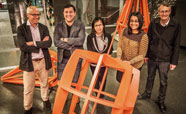 The Burden of Disease Epidemiology, Equity and Cost-Effectiveness Programme (BODE³) was a Health Research Council funded research programme. It has studied the health and wider societal gains, costs, cost-effectiveness and equity impacts of health sector interventions, and has built capacity in modelling of health sector interventions.
The Burden of Disease Epidemiology, Equity and Cost-Effectiveness Programme (BODE³) was a Health Research Council funded research programme. It has studied the health and wider societal gains, costs, cost-effectiveness and equity impacts of health sector interventions, and has built capacity in modelling of health sector interventions.
Health Research Council funding for the BODE3 Programme officially finished in January 2022. This programme of research has produced important evidence on the health impacts and cost effectiveness of a range of policies and interventions for Aotearoa New Zealand. It has also supported many staff in developing skills in the field of epidemiological/health economic modelling. Going forward, there are a number of modelling research projects that will be continuing in the Department of Public Health and these projects will form a research network: SiHMNet: Simulation Health Modelling Network. Additional work that builds on BODE³ tobacco modelling is being led by the University of Melbourne.
Email bode3@otago.ac.nz
Web otago.ac.nz/wellington/publichealth/research/bode3
Cancer and Chronic Conditions (C3) research group
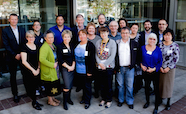 The Cancer and Chronic Conditions (C3) research group is a collaborative group of researchers working at the interface between public health, health services research, and clinical medicine. Our work includes a range of projects aimed at reducing the impact of cancer and chronic conditions on population health and health inequalities through policy and health system change.
The Cancer and Chronic Conditions (C3) research group is a collaborative group of researchers working at the interface between public health, health services research, and clinical medicine. Our work includes a range of projects aimed at reducing the impact of cancer and chronic conditions on population health and health inequalities through policy and health system change.
Email jason.gurney@otago.ac.nz
Web otago.ac.nz/wellington/publichealth/research/cancercontrol
Cancer Society Research Collaboration
 We aim to reduce the incidence and impact of cancer in New Zealand, and to reduce cancer-related inequalities.
We aim to reduce the incidence and impact of cancer in New Zealand, and to reduce cancer-related inequalities.
We work in close coordination with the Cancer Society of New Zealand to prioritise the research we conduct, disseminate our findings, and advocate for world-leading cancer prevention, care and support.
Our partners include Massey University, Michigan State University, The University of Melbourne, and Victoria University of Wellington.
Email louise.signal@otago.ac.nz
Web otago.ac.nz/cancer-society-research
Centre for Translational Cancer Research - Te Aho Matatū
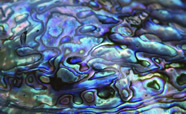 Translational cancer research bridges the gap between laboratory-based science and treatment in the clinic. We now have sufficient knowledge in the fields of cancer biology, molecular biology, and immunology to make a significant impact on the treatment and management of cancer.
Translational cancer research bridges the gap between laboratory-based science and treatment in the clinic. We now have sufficient knowledge in the fields of cancer biology, molecular biology, and immunology to make a significant impact on the treatment and management of cancer.
We're bringing about rapid improvements in cancer outcomes by addressing defined clinical problems. Our research is accelerating the development and testing of new drugs and diagnostic tools that directly assist clinicians and their patients.
Our research programmes include:
- Personalised medicine
- Inherited and environmental cancer risk
- Childhood cancers
- Diagnostic tools
- Cancer and our immune system
- Drug development
Email ctcr@otago.ac.nz
Web otago.ac.nz/ctcr
Health Inequalities Research Programme (HIRP)
 The Health Inequalities Research Programme is a longstanding programme of research hosted by the Department of Public Health, University of Otago, Wellington. HIRP encompasses a series of research projects including the New Zealand Census Mortality and CancerTrends Study (NZCMS/CT), the Healthier Lives National Science Challenge, and the Virtual Health Information Network (VHIN). The aim of HIRP is to capitalise on New Zealand's Integrated Data Infrastructure (IDI) to provide information to influence and support policies and programmes that will reduce inequalities in health.
The Health Inequalities Research Programme is a longstanding programme of research hosted by the Department of Public Health, University of Otago, Wellington. HIRP encompasses a series of research projects including the New Zealand Census Mortality and CancerTrends Study (NZCMS/CT), the Healthier Lives National Science Challenge, and the Virtual Health Information Network (VHIN). The aim of HIRP is to capitalise on New Zealand's Integrated Data Infrastructure (IDI) to provide information to influence and support policies and programmes that will reduce inequalities in health.
Email hilary.day@otago.ac.nz
Web otago.ac.nz/wellington/publichealth/research/hirp
Hugh Adam Cancer Epidemiology Unit
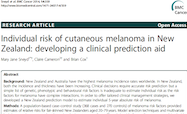 The Unit regularly examines trends in cancer incidence, mortality, and survival in New Zealand as well as conducting research into the causes, detection, and prevention of cancer. Collaborative studies are being, or have been, conducted of cancer of the prostate, breast, colon, rectum, cervix, skin (melanoma and non-melanoma skin cancer), stomach, ovary, mouth and oral cavity, lung, head and neck, non-Hodgkin lymphoma and chronic lymphocytic leukaemia in New Zealand. In addition, with biomedical scientists, studies linking specific cancer risk factors with biological mechanisms of cancer development of are being undertaken.
The Unit regularly examines trends in cancer incidence, mortality, and survival in New Zealand as well as conducting research into the causes, detection, and prevention of cancer. Collaborative studies are being, or have been, conducted of cancer of the prostate, breast, colon, rectum, cervix, skin (melanoma and non-melanoma skin cancer), stomach, ovary, mouth and oral cavity, lung, head and neck, non-Hodgkin lymphoma and chronic lymphocytic leukaemia in New Zealand. In addition, with biomedical scientists, studies linking specific cancer risk factors with biological mechanisms of cancer development of are being undertaken.
The Unit also specialises in the design, evaluation and monitoring of national cancer screening programmes and the calculation of an individual's risk of specific cancers. The individual risk calculator for melanoma has been accepted internationally. The Unit has numerous collaborations with national and international institutions and also represents New Zealand in the International Cancer Screening Network of the National Cancer Institute (USA) and the International Lung Cancer Consortium of the International Agency for Research on Cancer (WHO).
Email: hughadam.unit@otago.ac.nz
Web otago.ac.nz/dsm/hughadam
Mackenzie Cancer Research Group
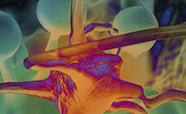 We are interested in the pathology of human tumours and in identifying the genetic changes that give rise to cancer. Our research focuses on the molecular regulation of tumour growth, metastasis and response to therapy.
We are interested in the pathology of human tumours and in identifying the genetic changes that give rise to cancer. Our research focuses on the molecular regulation of tumour growth, metastasis and response to therapy.
Due to our close links with clinicians at Christchurch hospital and with the Cancer Society Tissue Bank, together with our laboratory expertise, we are able to carry out investigations that span from bench to bedside.
Email pathology.uoc@otago.ac.nz
Web http://www.otago.ac.nz/mackenzie-cancer/index.html
Otago Genomics Facility
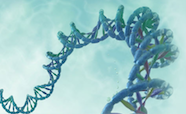 We provide expertise and sequencing resources to New Zealand researchers and industry including:
We provide expertise and sequencing resources to New Zealand researchers and industry including:
- Project design
- Library preparation
- Illumina sequencing
- Oxford Nanopore sequencing
- Nanostring nCounter analysis
The Otago Genomics Facility is an Illumina Propel-certified service provider for Illumina platforms, and is also a Nanostring nCounter analysis system core facility.
Email genomics@otago.ac.nz
Web otago.ac.nz/genomics
Pathology and molecular medicine
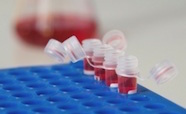 Current research activities within the Department focus on the causes and behaviour of various cancers with a specific emphasis on prostrate, kidney, breast, cervix, and bladder malignancy. Urogenital pathology and dental research are also areas of research interest.
Current research activities within the Department focus on the causes and behaviour of various cancers with a specific emphasis on prostrate, kidney, breast, cervix, and bladder malignancy. Urogenital pathology and dental research are also areas of research interest.
Email pathology.uow@otago.ac.nz
Web otago.ac.nz/wellington/departments/pathologymolecularmedicine/research
Research Infrastructure Centre
 Our Research Infrastructure Centre offers specialist expertise, technology and facilities in protein research, genomics, imaging, and biomedical research.
Our Research Infrastructure Centre offers specialist expertise, technology and facilities in protein research, genomics, imaging, and biomedical research.
We support optimum design and analysis of your research, and provide skill development opportunities.
Our academic leadership is of the highest calibre and we have extensively experienced and skilled staff.
Our services are available to researchers in institutions, industry, government and private companies.
Email ric.admin@otago.ac.nz
Web otago.ac.nz/healthsciences/research/ric
Search the Health Sciences Expertise Database
 The Division of Health Sciences benefits from its high calibre of staff and their wide range of skills and research expertise.
The Division of Health Sciences benefits from its high calibre of staff and their wide range of skills and research expertise.
Our Staff Expertise Database provides details on University of Otago, Health Sciences staff. Each staff profile provides information on qualifications, current academic position, contact details, and a summary of research and publications.
You can search our database by keyword (eg cancer) or by name.
Health Sciences expertise database
Social and Behavioural Research Unit
The Social and Behavioural Research Unit was established in 1990 with core funding from the Cancer Society of New Zealand and the support of the University of Otago. Presently it has research programmes in priority areas of tobacco control, ultraviolet radiation exposure, physical activity and nutrition, psycho-social-spiritual factors, alcohol, and Hauora Māori.
Emailsbru@otago.ac.nzWeb otago.ac.nz/sbru
Te Rōpū Rangahau Hauora A Eru Pōmare
 Te Rōpū Rangahau Hauora a Eru Pōmare strives to create a Kaupapa Māori space committed to improving Māori health outcomes and eliminating inequalities through quality science and ongoing theoretical development. It takes a rights-based approach consistent with the Treaty of Waitangi, and is engaged with community through a spectrum of influence from community development, policy advocacy, research dissemination and Māori health research workforce development.
Te Rōpū Rangahau Hauora a Eru Pōmare strives to create a Kaupapa Māori space committed to improving Māori health outcomes and eliminating inequalities through quality science and ongoing theoretical development. It takes a rights-based approach consistent with the Treaty of Waitangi, and is engaged with community through a spectrum of influence from community development, policy advocacy, research dissemination and Māori health research workforce development.
Email bridget.robson@otago.ac.nz
Web otago.ac.nz/wellington/publichealth/research/erupomare
Research features
Genetic jeopardy
Knowledge of her whakapapa saved Dr Karyn Paringatai's life. Now this experience is inspiring her research.
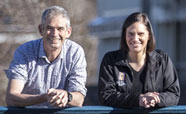
Related story:
Life saver
Taking action
Te Ara Auahi Kore (TAKe) is a new research programme seeking to understand – and reduce – disproportionately high rates of smoking among Māori.
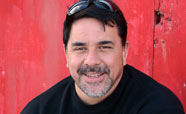
Vaccinating against cancer
Professor Sarah Young describes innovative methods for activating anti-tumour immune responses.
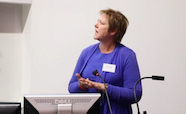
Vaccinating against cancer (video approx 16 minutes)
Risk reduction
Dr Rose Richards Hessell spills the beans on public awareness about factors affecting cancer risk.
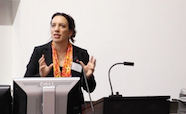
What does the public know about preventing cancer? (video 16 mins)
What does the public know about preventing cancer? (PDF 830 KB)
Puzzling disparity
The disparity of New Zealand's testicular cancer rates between ethnic groups may shed light on the causes of testicular cancer.
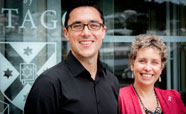
Dr Jason Gurney and Professor Di Safarti
Helping make sense of genetic information
Geneticist Associate Professor Logan Walker has won a prestigious research fellowship to develop better ways of identifying high-risk breast and ovarian cancer patients.
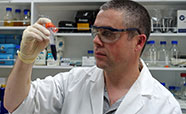
Associate Professor Logan Walker: "Deciding who should receive genetic testing, and interpreting the test results, are two major dilemmas for health care professionals."
View Logan's presentation on his work at the Otago Spotlight Series: Cancer research symposium.
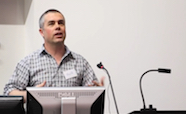
Genetic health for personalised cancer care and prevention (video 18 mins)
Genetic health for personalised cancer care and prevention (PDF 1.4 MB)

